A Power of Attorney (POA) in Michigan is a document with which a person can authorize another to act on their behalf with the same level of authority.
A POA is used to transfer decision-making authority to someone else to allow that person to make legally binding decisions concerning the person granting authority or their affairs. The person granting the authority is referred to as the principal, and the person to whom authority is granted is designated the attorney-in-fact or agent.
POAs allow the attorney-in-fact to take specific actions or make decisions when the principal is unable to do so, either due to incapacitation, absence, or the attorney-in-fact needs to execute some duty for which they were hired. A POA in Michigan will specify what matters the attorney-in-fact can represent the principal and the extent to which the attorney-in-fact authority remains valid. Affairs entrusted to an attorney-in-fact using a POA are usually financial matters, medical care decisions, the care of minor children, or any other custom arrangement.
The attorney-in-fact decisions made on behalf of the principal are legally binding. Therefore, they cannot be revoked later, as the decision is respected as though the principal themself had made the decision. Furthermore, an attorney-in-fact who uses the powers granted to act contrary to their principal’s interest is liable to civil or criminal prosecution in the state.
Free Editable POA Forms
Below are professionally designed and readily available templates for Michigan POA Forms. They are available for free download and provide a convenient and efficient solution for drafting your documents. By using these templates, you can save time, ensure accuracy, and have a well-crafted POA tailored to your specific needs.
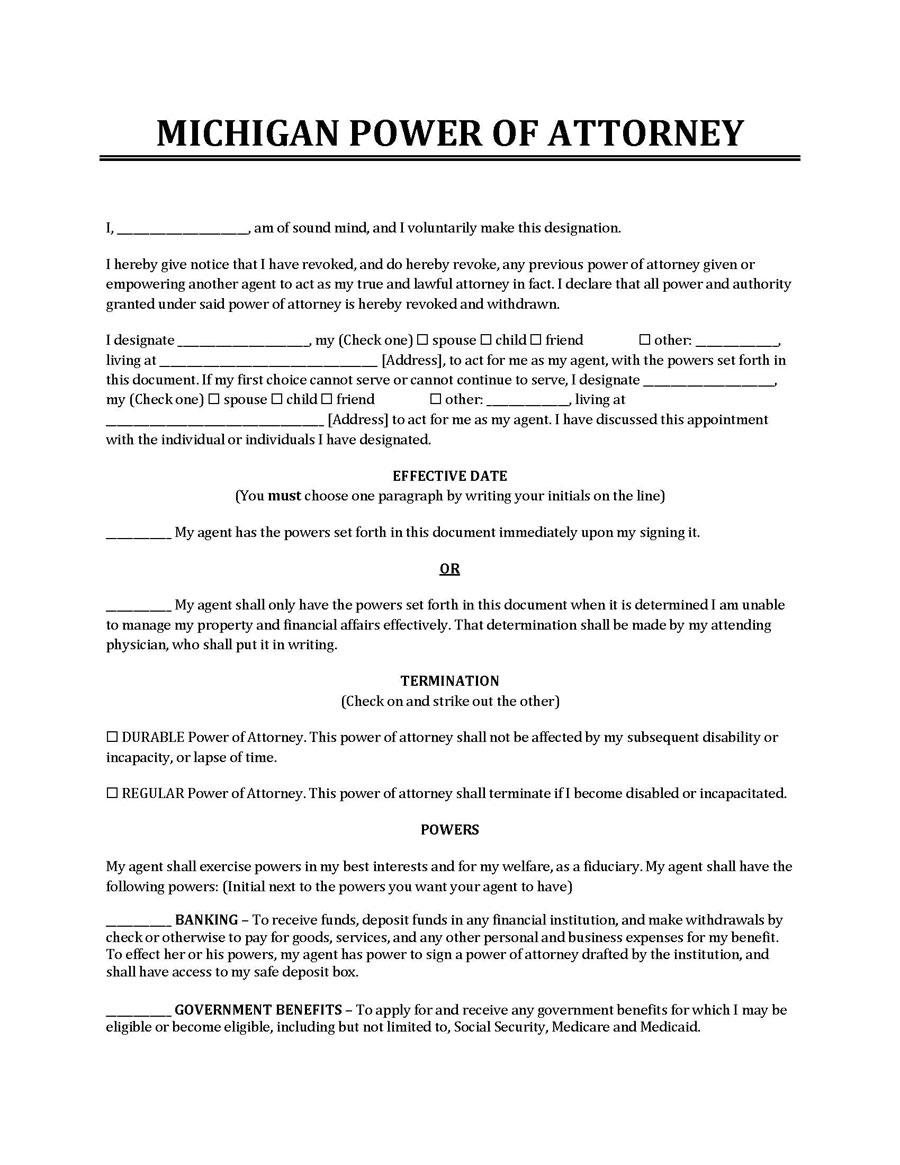
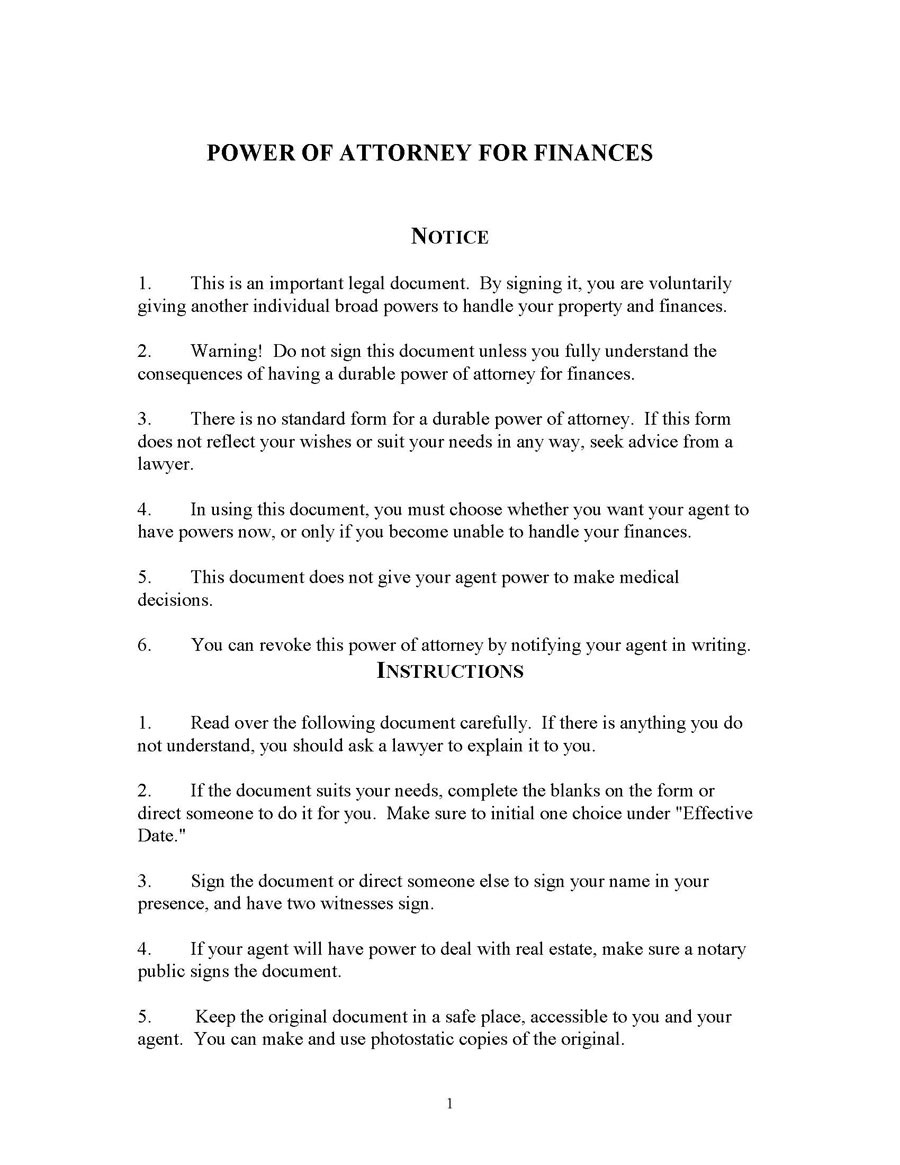
Using a POA document
A Michigan POA document informs all relevant entities that the person whose name is specified in the document has been empowered to act by the principal in their stead. As an agent, this intent must be communicated accurately to facilitate the function of the responsibility given.
The document that identifies you have POA
The POA document signed by the principal identifies the agent as their representative in Michigan. A copy of this document should be present with the agent on any occasion when they have to make a decision or sign for the principal.
EXAMPLE
While some institutions might make filings to document the transfer of authority, a POA document will be required at a first meeting. The agent should also carry a means of identification, such as a driver’s license, to verify that they are the person named in the identifying document.
Use the correct procedure for signatures
The principal is involved in whatever decision the attorney-in-fact makes, and this must be reflected every time the attorney-in-fact signs on behalf of the principal. Therefore, every signature the attorney-in-fact makes must show the principal’s name first, followed by an indication that the signature was made on behalf of the principal. This should typically include statements such as “[principal’s name] by [agent’s name]”, followed by the designation “attorney-in-fact”.
Michigan Power of Attorney Requirements
Section 700.5501 of the Michigan Compiled Laws details the conditions that must be satisfied when creating a POA for the delegation of authority to be acknowledged under the law.
A POA document must satisfy the following:
- Include the principal’s complete name and address: The person granting authority to another for using a POA must be easily identifiable by whomever the POA is presented to. Therefore, the POA should include the principal’s first name, middle name, last name, and address in a POA.
This is usually the starting part of a POA and includes statements such as
EXAMPLE
“I [principal’s name] of [principal’s address] grants….”
- Include the complete name and address of the attorney-in-fact: The person to whom the principal is granting authority should likewise be easily identifiable without error. Therefore, the attorney-in-fact’s first name, middle name, last name, and address should also appear on the POA.
This typically follows the statement detailing what powers are being granted and includes statements such as
EXAMPLE
“to [attorney-in-fact’s name] of [attorney-in-fact’s address].
- Include the date on which the document was signed: The date that appears on the POA notifies all parties involved of the time that the document came into existence. The date is also essential for determining when the attorney-in-fact gains authority when statements such as
EXAMPLE
“effective immediately” or “in X days” denote the period of activation of the POA.
- State the powers being granted to the attorney in fact and the date the powers become effective: A POA must clearly define what authority is given to confine the responsibility of the attorney-in-fact solely to what is intended. The wording must be clear, concise, and prevent ambiguity. Wording such as “all”, “total”, or “general” should be used carefully. The period from which the attorney-in-fact can begin to function must also be stated to either begin immediately, at a date in the future or upon the occurrence of an event.
- State the duration for which the attorney-in-fact retains the powers granted: An indication must be included in a POA to show how long the attorney-in-fact is to represent the principal. As most POAs in Michigan are durable by default, a particular date in the future or the occurrence of a specific event must be stated to be the endpoint of an attorney-in-fact’s authority.
- Include the signature of the principal or a notary public made on behalf of the principal in the presence of the principal: The principal of a POA must indicate that the transfer of authority to the attorney-in-fact is made with their consent. The principal must sign upon the POA document in the presence of a notary public or two witnesses to certify that they are indeed delegating authority to the attorney-in-fact.
- The signature of a notary public or two witnesses: To prevent the seizing of authority from an unwitting person, a POA must be signed before a notary public or two witnesses (neither of whom is the attorney-in-fact) to certify the document.
After a POA document is established, the attorney-in-fact must sign an acceptance that states that they receive the powers granted and will act in the principal’s best interest.
Types of POA in Michigan
There are several types of Michigan POAs to facilitate a variety of arrangements. The type of POA used to set up an arrangement determines what scope of power can be given to the attorney-in-fact, and the affairs that can be managed using that POA.
Here are several Michigan power of attorney types:
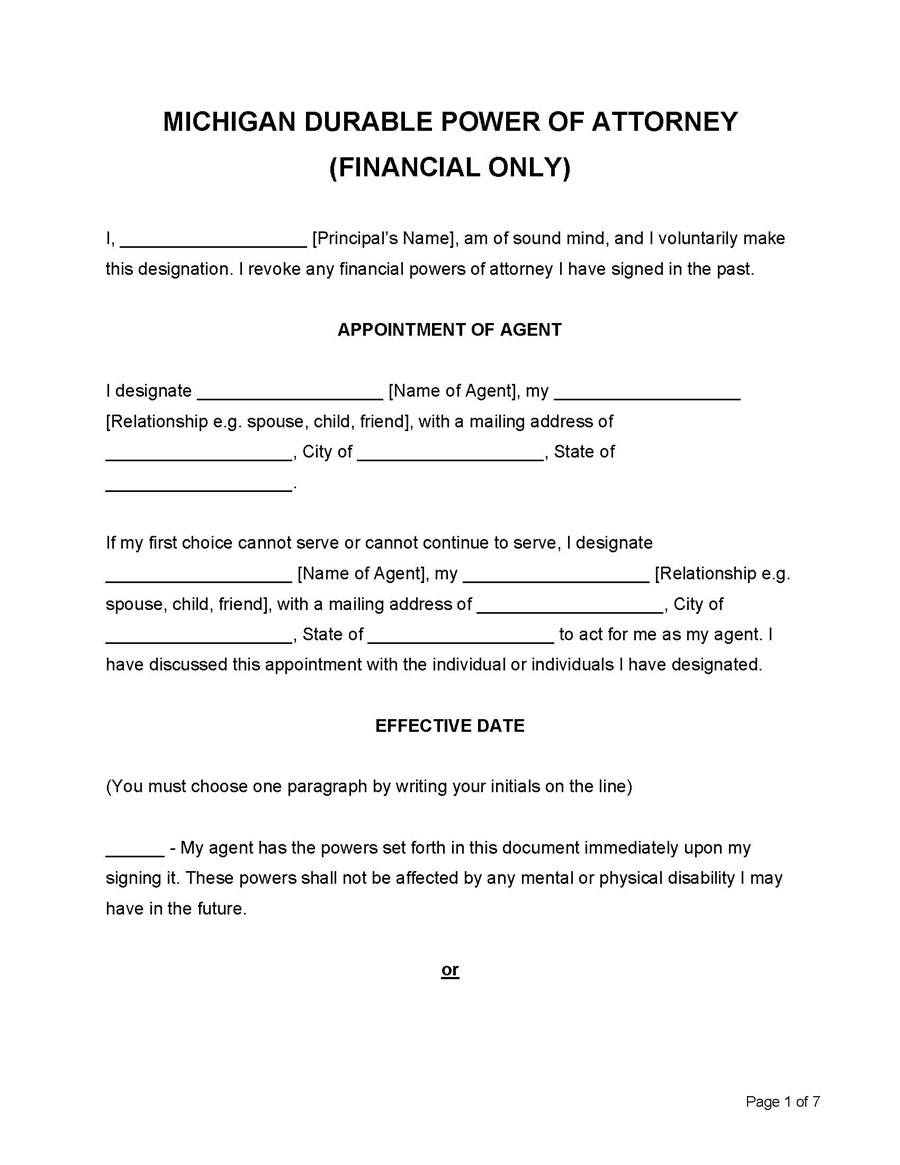
Durable (Financial) Power of Attorney Form
Download: Microsoft Word (.docx)
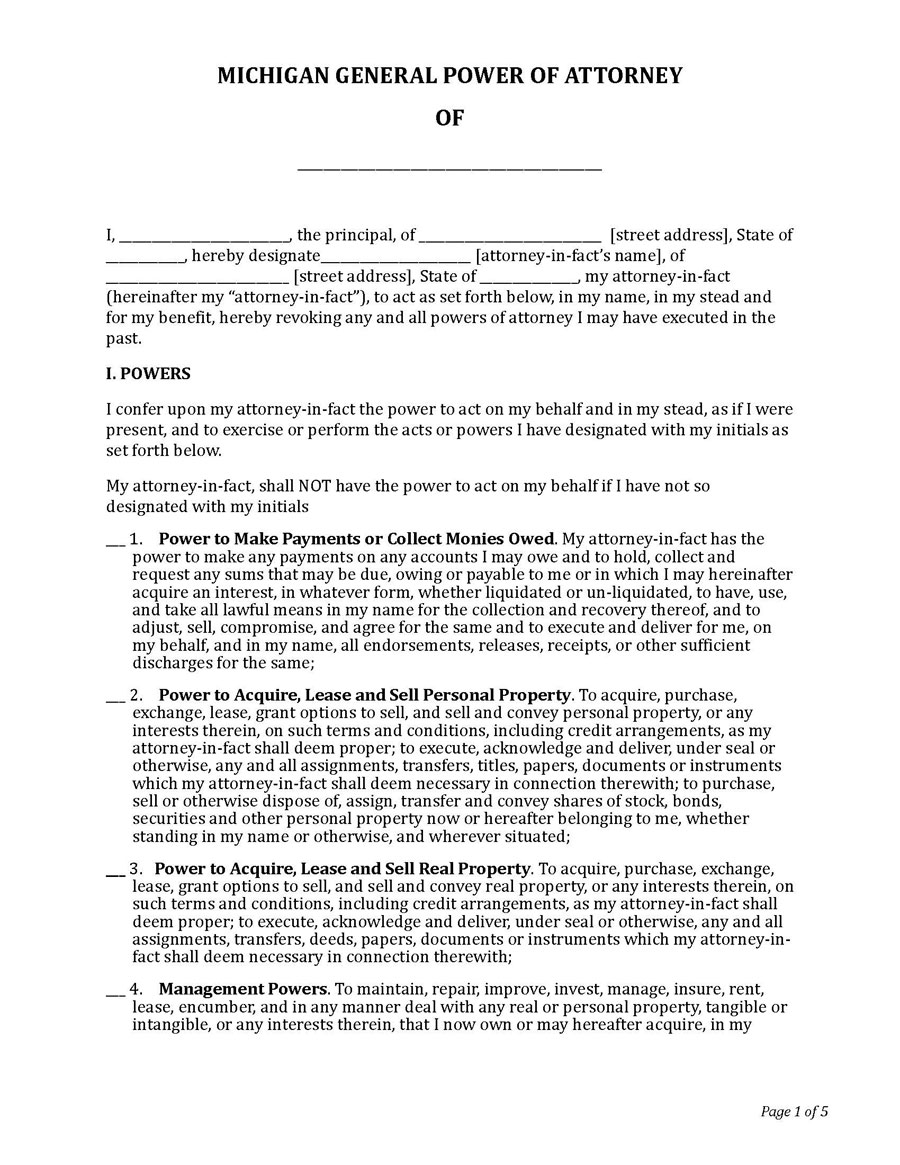
General (Financial) Power of Attorney Form
Download: Microsoft Word (.docx)
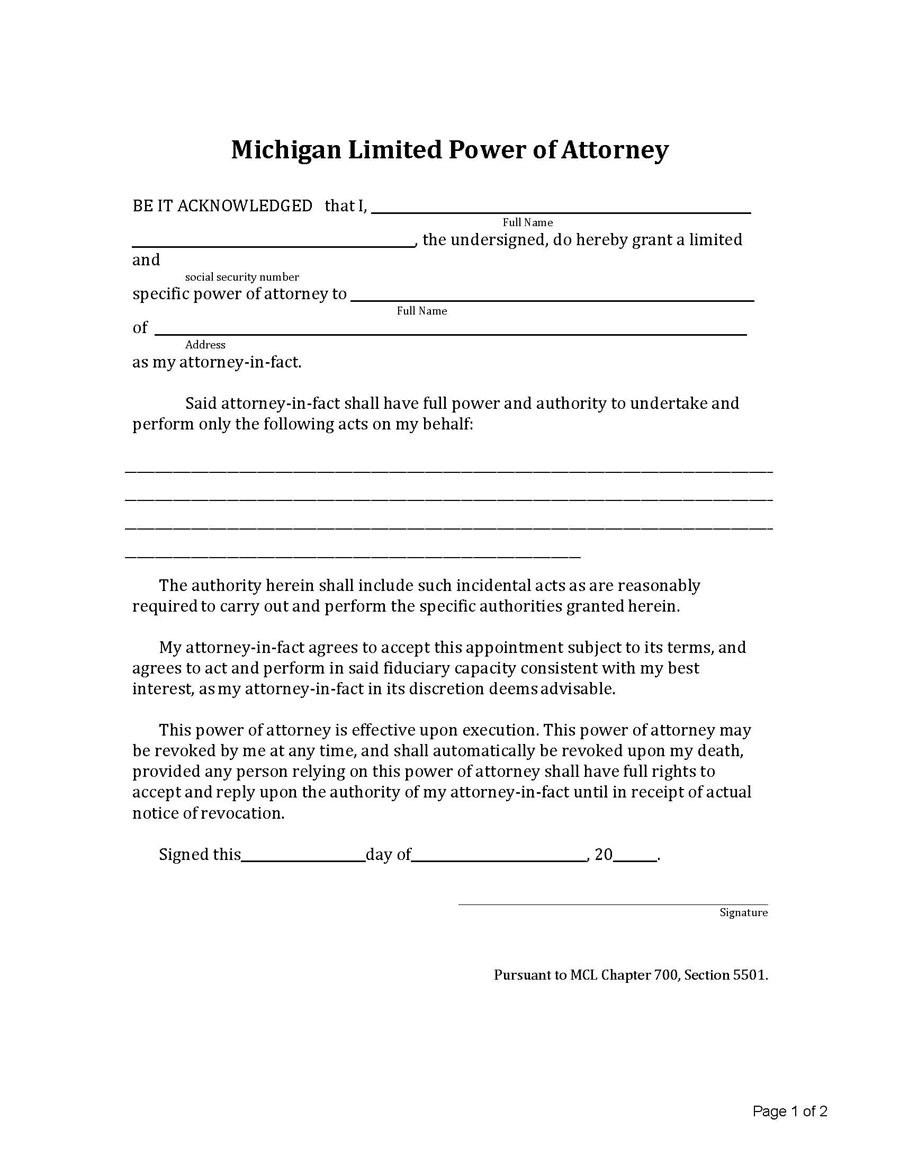
Limited Power of Attorney Form
Download: Microsoft Word (.docx)
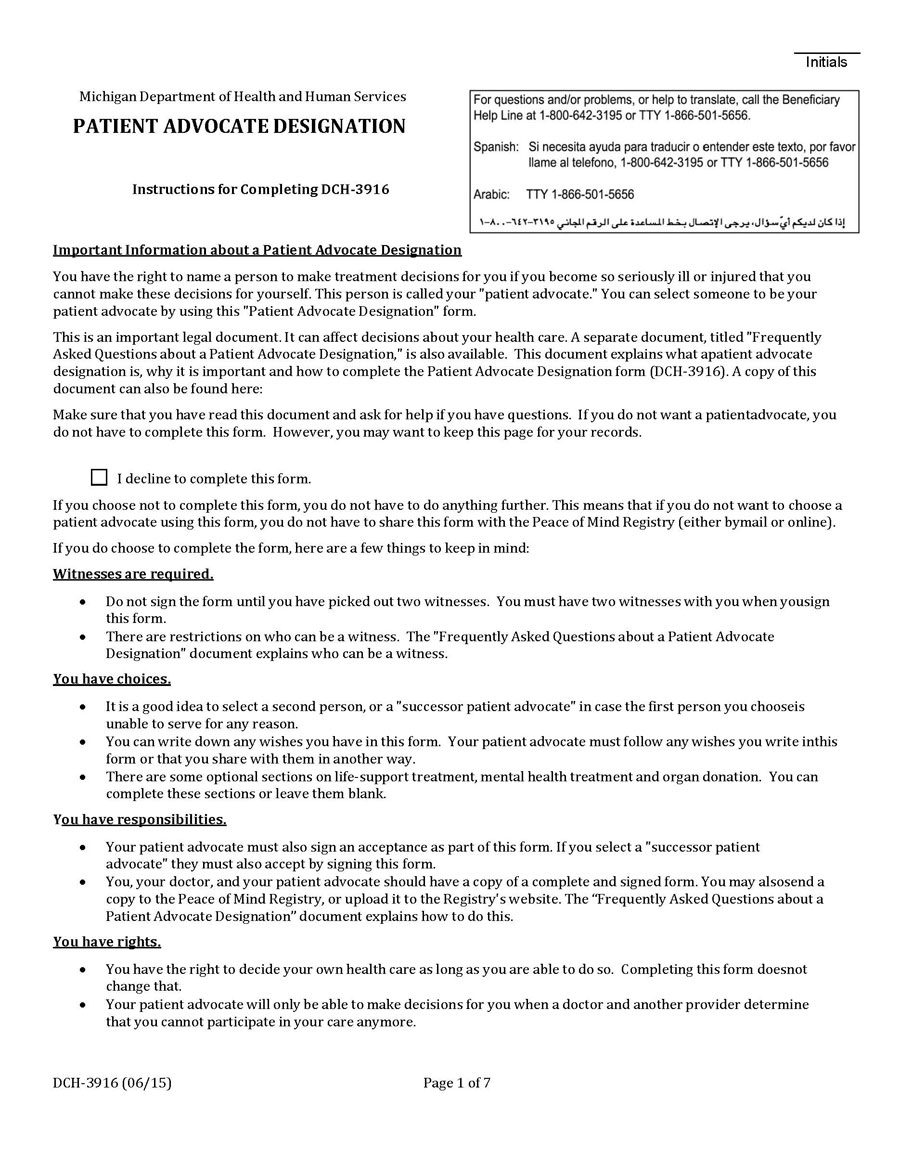
Medical Power of Attorney Form
Download: Microsoft Word (.docx)
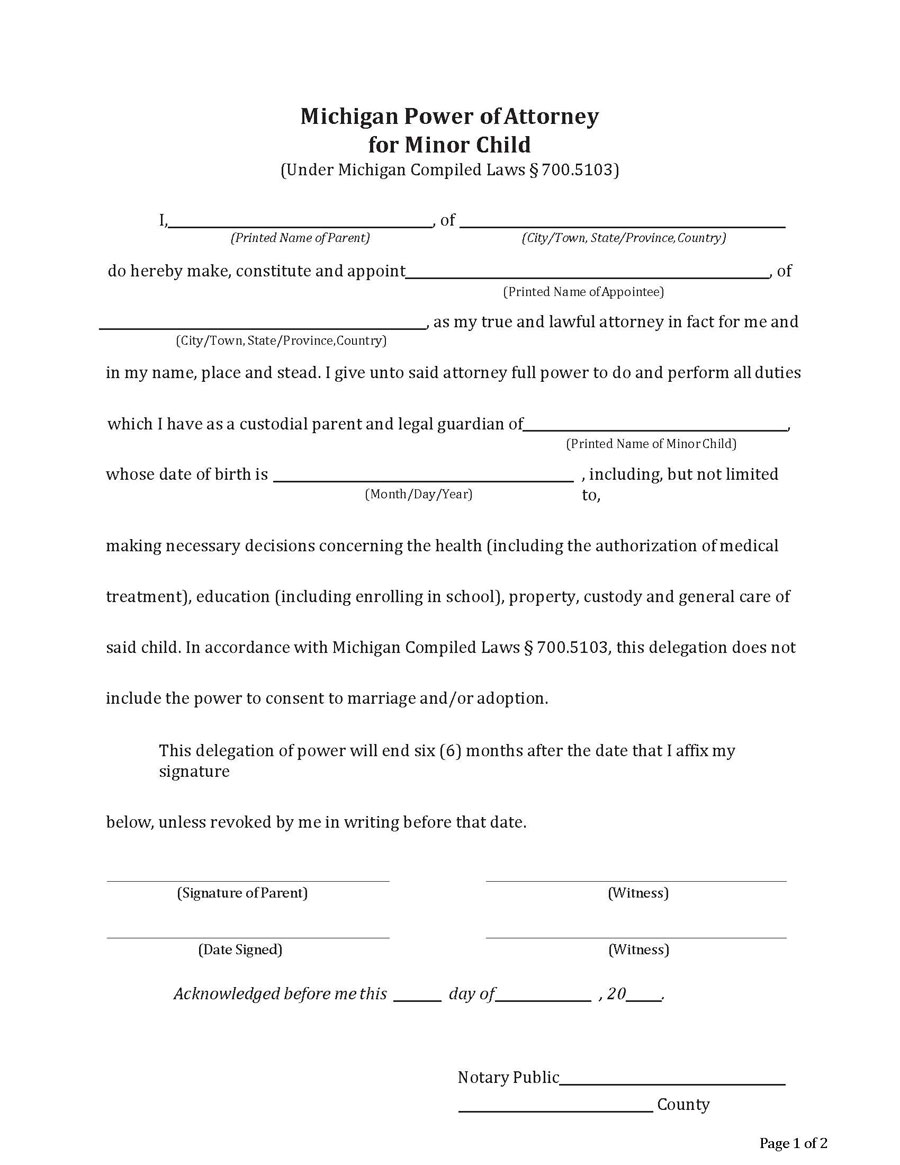
Minor Power of Attorney Form
Download: Microsoft Word (.docx)
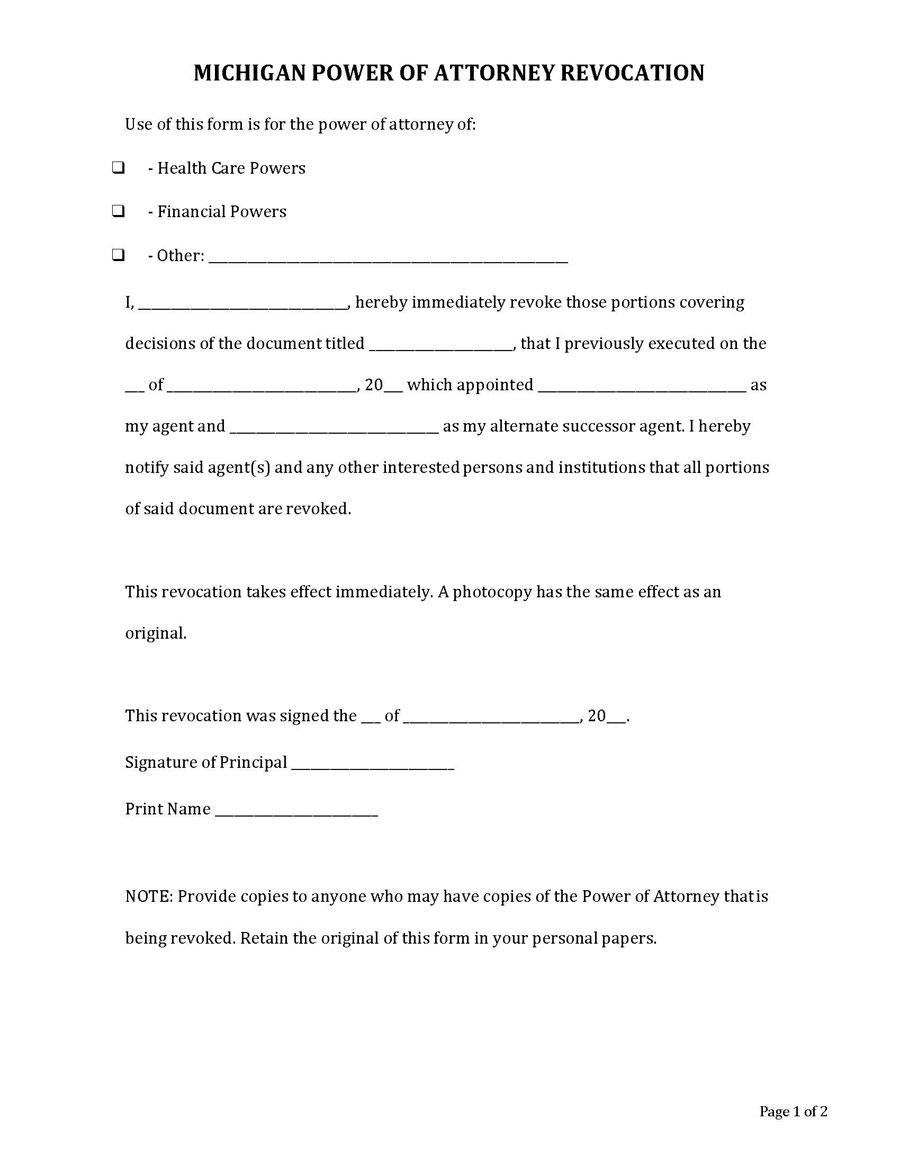
Power of Attorney Revocation Form
Download: Microsoft Word (.docx)
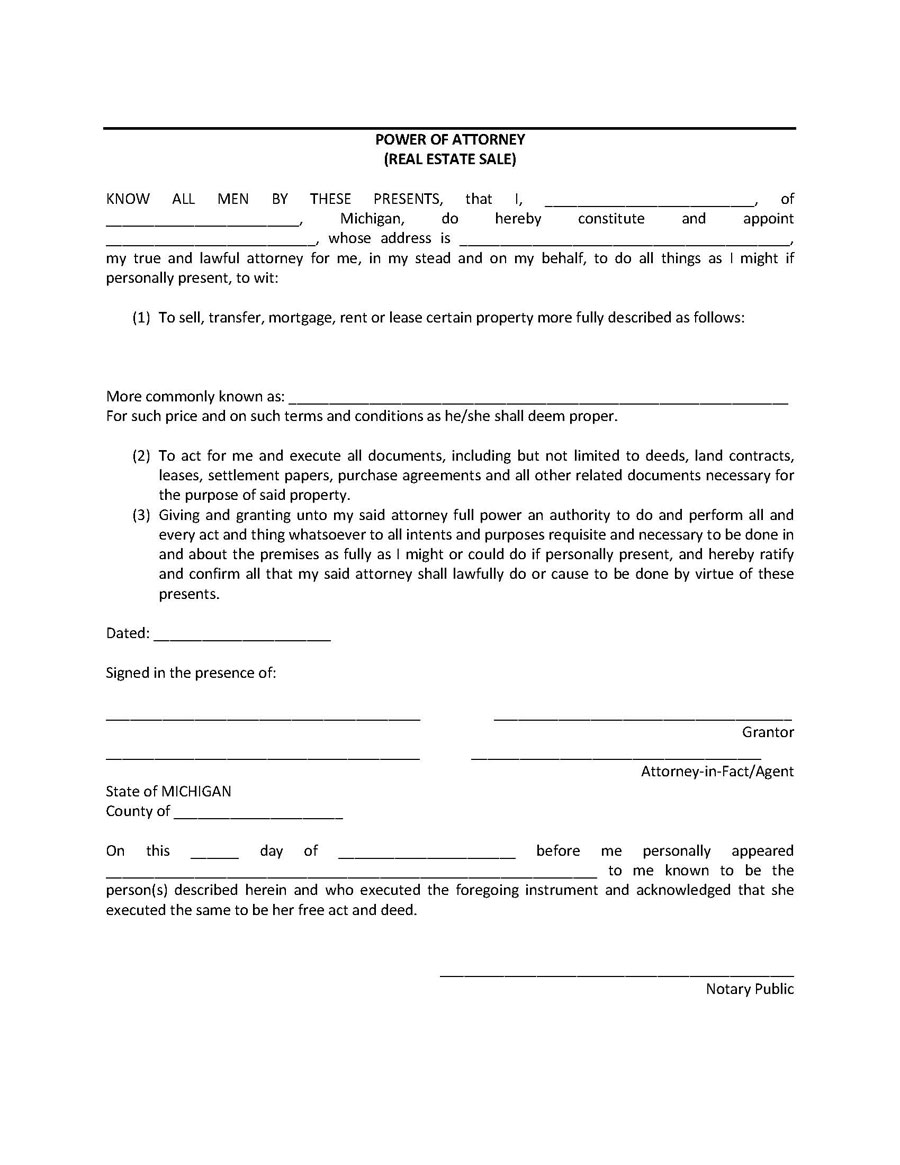
Real Estate Power of Attorney Form
Download: Microsoft Word (.docx)
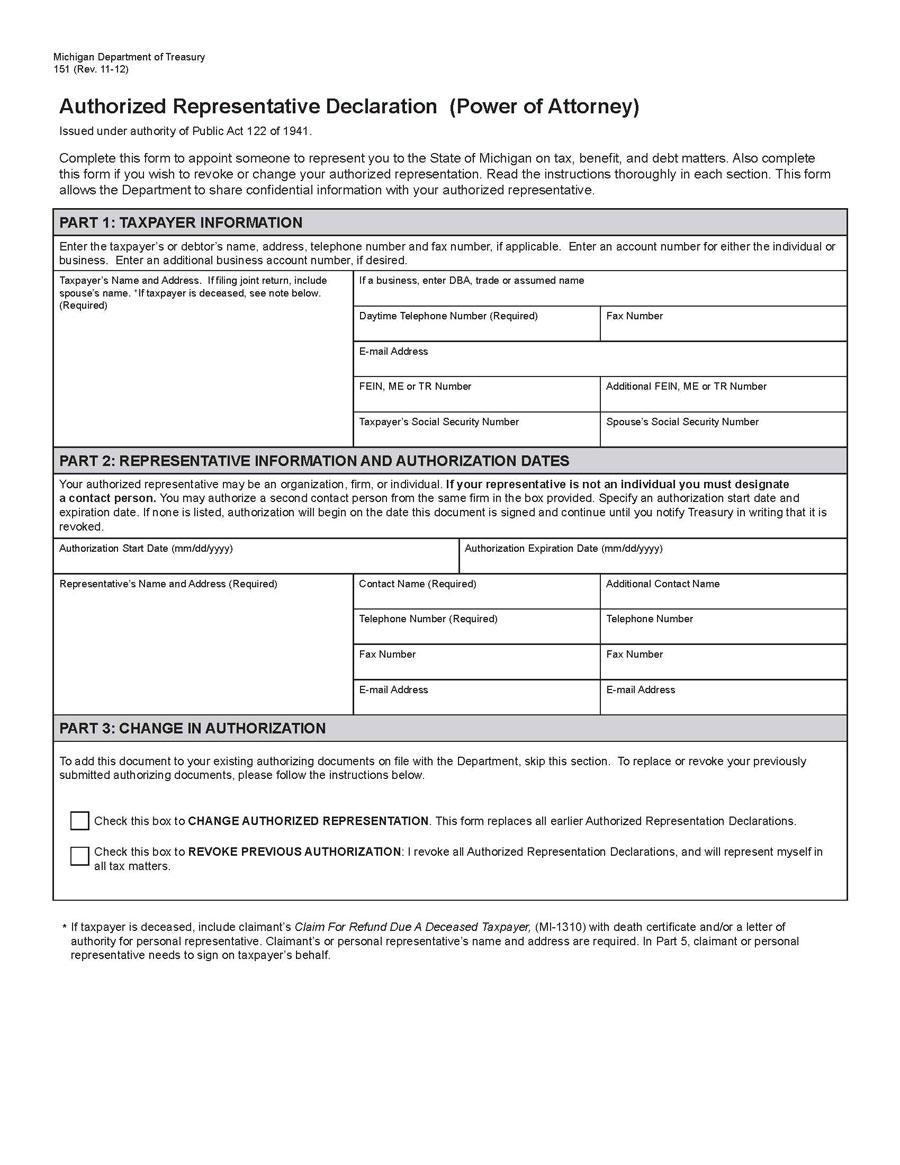
Tax Power of Attorney Form
Download: Microsoft Word (.docx)
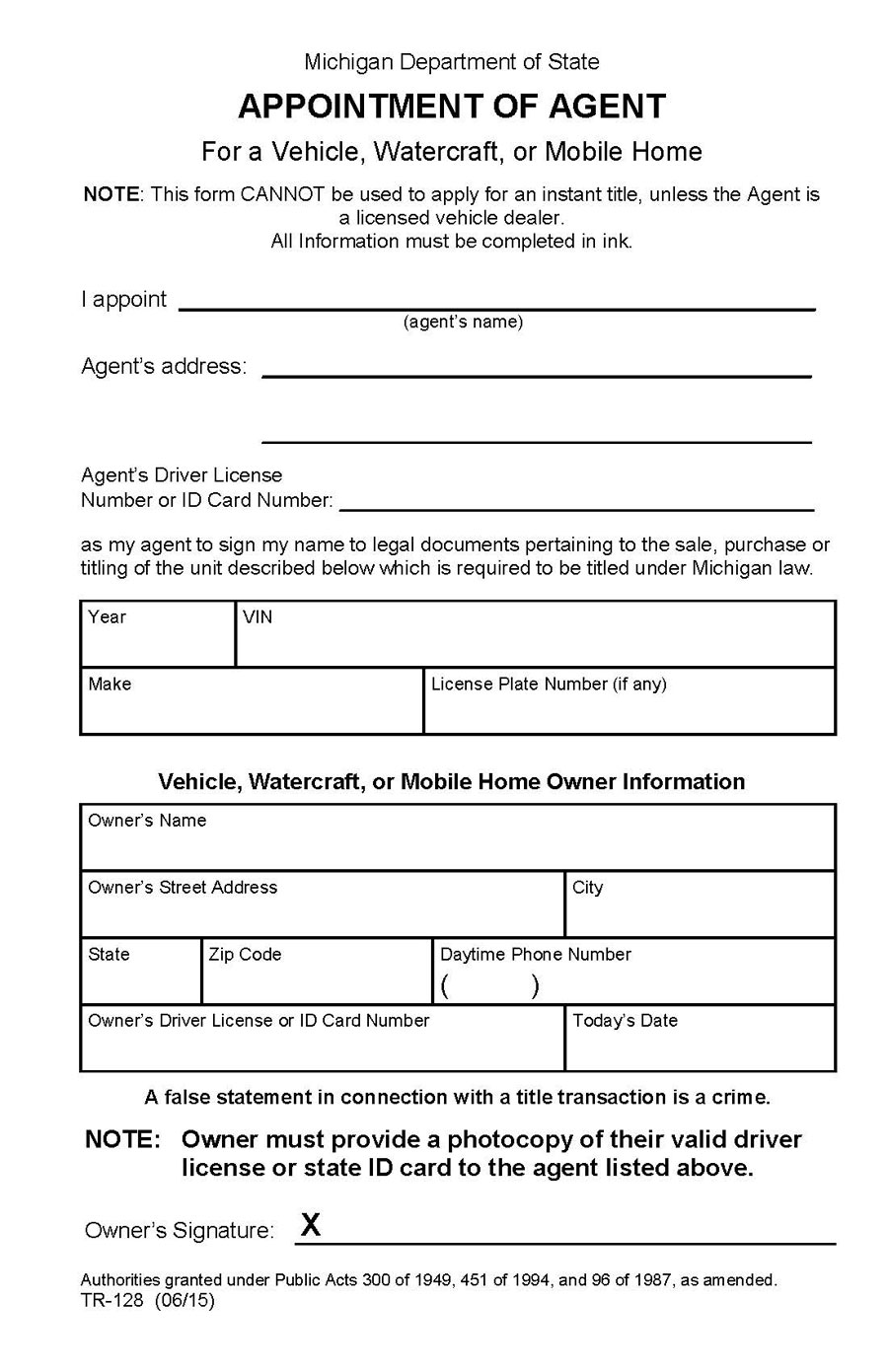
Vehicle Power of Attorney Form
Download: Microsoft Word (.docx)
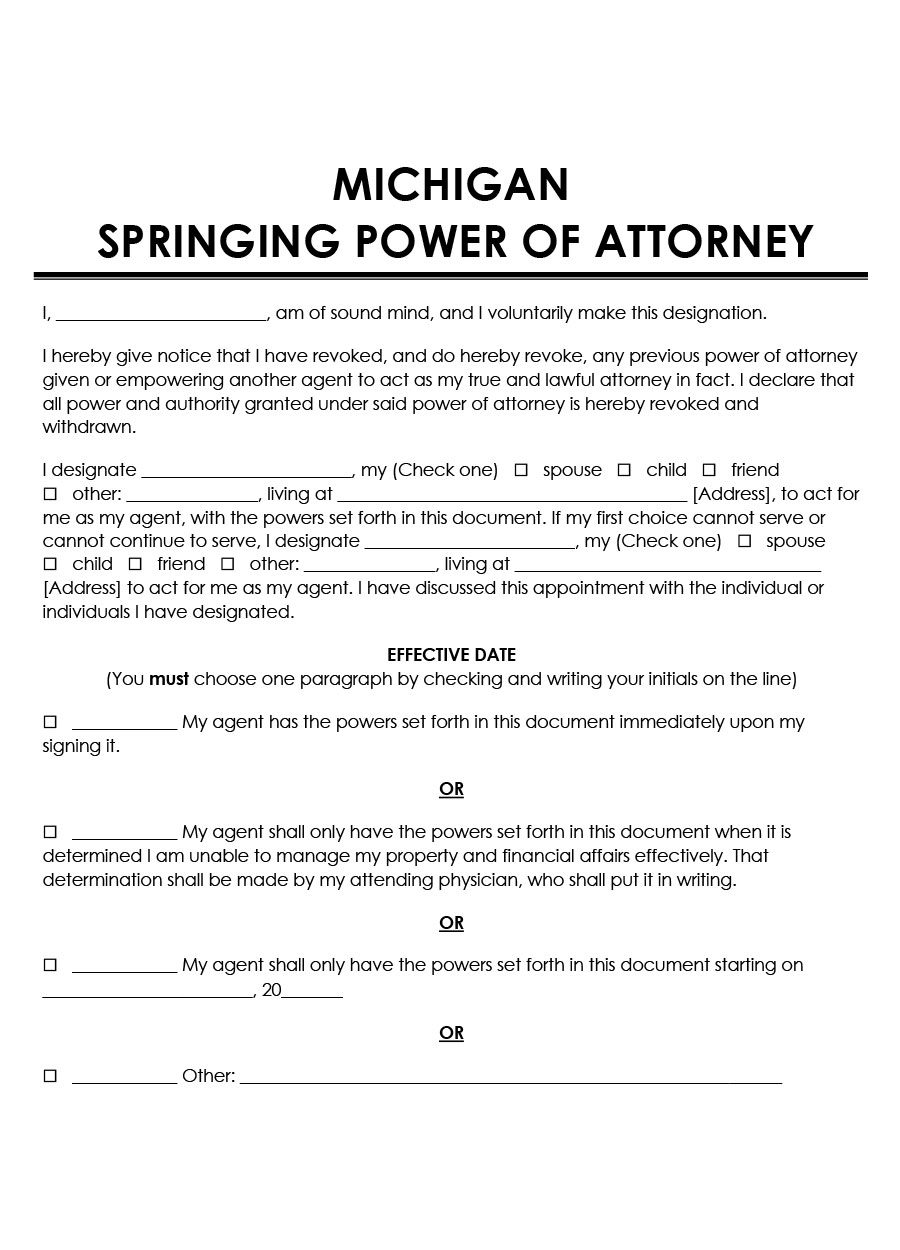
Springing Power of Attorney Form
Download: Microsoft Word (.docx)
How to Get Power of Attorney in Michigan?
It is created by a handwritten or typed document that states the principal is empowering some individual to make decisions on their behalf on a specific matter, to a specific extent, and within a specific period.
There are no standardized documents for creating a POA, except in specific instances, but the requirements by law stated above must be included in any document to serve this purpose.
A POA can also be written up on behalf of the principal as long as the principal directs the writing and is mentally competent enough to do so.
Creating a POA is a straightforward task and can be easily accomplished using the following steps:
Grant authority and present stipulations
A POA grants authority to another person, either bounded or unbounded. A POA must include a clear statement of the authority being given to an attorney-in-fact. This statement should indicate the particular affair to be delegated. If the powers granted to the agent are to be regulated, the POA should also include a statement to that effect. An agent can likewise be given total authority over an aspect of the principal’s affairs.
Principal sign and date
The principal must sign the POA document before either a notary public, two witnesses (neither of whom is the attorney-in-fact), or both to give the document legal authority. The date on which the POA is signed must also be included to make it obvious when the agent’s powers can come into effect.
Accept the POA
The attorney-in-fact is then required to sign an acceptance of the powers and responsibility conferred for the POA to be fully established. After this, the attorney-in-fact can begin to act on behalf of the principal when the POA activates based on the date written in the POA or upon the occurrence of any condition set by the principal (for springing POAs).
Related: Michigan LLC Operating Agreement Forms | Starting an LLC
Conclusion
A Michigan POA is a handy document for any resident of the state of Michigan to possess as a safeguard against the uncertainties of the future. By transferring authority from one person to another when needed, assurance can be created that some affairs are being taken care of even not present. For example, undesired medical procedures can be prohibited during medical emergencies, minor children can be cared for in absentia, and professionals can be given leeway to conduct their business uninterrupted.
POAs are powerful documents carefully regulated under the law. Principals and attorneys-in-fact must adhere to specific stipulations when creating one to ensure that the document is valid. While comparatively easy to use, POAs have a significant impact that should necessitate care when creating one.












